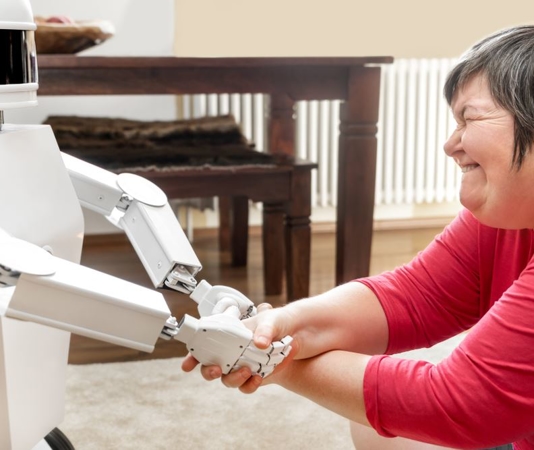Download the Build a Caregiving Business Brochure

Why Robots Won’t Replace Qualified Human Caregivers
June 11, 2019
The world is rapidly changing, and nowhere is that fact more evident than in the world of home care. With an aging population, it’s estimated that the number of 65 year-olds and above will nearly double by 2050, creating a serious senior care gap that needs to be addressed in the coming decades.
In order to address the elder care crisis and combat the effects of senior isolation, many researchers are now focusing their efforts on a brand new kind of caregiving: The kind provided by robots and artificial intelligences, that is. Although that may sound more like the Jetsons than real life, there are already preliminary models of robot caregivers for seniors – and they’re progressing faster than you might think.
The Future of In-Home Caregiving
Artificial intelligences and robots are becoming more advanced with every passing year. When initial prototypes of AvatarMind’s promising “iPal” robot were introduced during the World Robotics Conference in Beijing, for example, attendees were impressed by their unique “socially assistive” programs, which allow the robots to monitor health signs, offer companionship, and provide cognitive stimulation. Although most tech experts predict that it could take decades for an affordable robot caretaker to hit the market, companies around the world are investing in similar robotics programs.
So where would something like the iPal leave human caregivers in the future? Based on a recent study at the Pew Research Center, most people are still unfamiliar with the concept of robotic assistants for in-home senior care. While many survey respondents expressed excitement and curiosity when told about this prospect, others – especially seniors – had serious reservations.
Compassionate Caregiving: Why Empathy Matters
Even after talking through the pros and cons, the majority of respondents agreed that there was just no substitute for human touch, or for the genuine compassion offered by a home caregiver. With more than 54% of all survey respondents specifically mentioning the need for human-to-human interaction and empathy, it seems that in-home caregiving still provides unique benefits that are beyond the reach of our most sophisticated AIs.
Additionally, most of the Pew Research Center respondents noted that they would be far more comfortable with a robot caretaker if a human being could monitor its actions, and also provide regular companionship. Because human caregivers have a better grasp of complex ethical decisions and interpersonal responsibilities, they may always be better equipped to handle the wide range of situations that come up during home care. In other words, perhaps the ideal combination for future home care will involve both robots and human beings, working together to help seniors age in place.
How We Support Caregivers
It’s clear that compassion and empathy are still the defining features of a great senior caregiver, and those very qualities may “future proof” this profession. But because of the frantic pace at most senior care and nursing home facilities, too many of today’s caregivers report that they feel emotionally exhausted and unable to provide adequate companionship.
At Homewatch CareGivers, our proven home care model allows caregivers to interact with seniors in their own homes, and give them the full time and attention they need. Our franchise owners are empowered to offer meaningful support for their caregivers, rather than add to the demands of compassion fatigue – which results in better overall care quality. With flexible scheduling that makes it easy for our caregivers to focus on a few clients, it’s possible for all seniors to get the care they deserve, in the comfort of home.
Want to learn more? Call (888) 718-5318 today to learn about our home care franchise opportunity!
Recent News

From Growth to Impact: Homewatch CareGivers’ 2025 Milestones and 2026 Outlook
February 20, 2026

How to Start an In-Home Care Business: A Step-by-Step Guide
October 7, 2025

What to Expect as a Home Care Franchise Owner
May 6, 2025

5 Things to Know Before Starting a Home Care Franchise in 2025
April 1, 2025

Why Corporate Professionals Are Investing in Senior Care Franchises
April 1, 2025

Todd Houghton Named to 2025 Titan 100 – Celebrating Leadership in Home Care
March 21, 2025

















